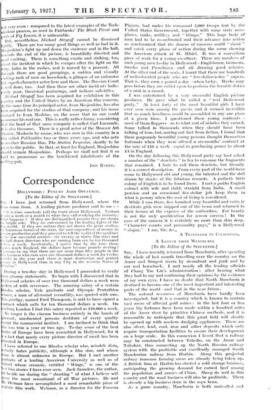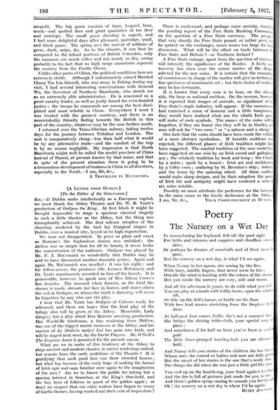A LErrra FROM MANCHURIA [To the Editor of the SPECTATOR.]
have recently returned from Manchuria, after spending the 'whole of last month travelling over the country on the Amur and Sungari rivers by steamboat and junk and by car and horseback. I met nearly all the leading officials of Chang Tso Lin's administration : after hearing what they had to say and confirming their opinions by the evidence of my own eyes, I have no doubt that North Manchuria is destined to become one of the most important and interesting parts of the world—and that in the near future.
The natural resources of Manchuria have hardly been investigated, but it is a country which is known to contain vast areas of alluvial gold mines : in the last four or five years big fortunes have been made within a hundred miles of the Amur river by primitive Chinese methods, and it is reasonable to anticipate that this great field will shortly be opened up with modern dredging appliances. There are also silver, lead, coal, iron and other deposits which only require transportation facilities to ensure their development on a large scale. In this connexion I heard that a railway may be constructed between Taheiho, on the Amur and Tsitsihar, thus connecting up the North Russian railway system with the profitable and excellently managed South Manchurian railway from Harbin. Along this projected railway immense farming areas arc already being taken up. A British firm at Harbin has started a cold storage business, anticipating the growing demand for corned beef among the population and armies of China. Sheep do well in this country and the wool business will also be profitable. Thera is already a big business done in the soya bean.
As a game country, Manchuria is both unrivalled and
unspoilt. The big game consists of tiger, leopard, bear, musk—and spotted deer and great quantities of roe deer and antelope. The small game shooting is superb, and I had some delightful days after pheasant, partridge, quail, and black game. The spring sees the arrival of millions of geese, duck, snipe, &c. As to the climate, it can best be compared to the inland portions of British Columbia, only the summers are much softer and not nearly so dry, owing probably to the fact that no high range mountains separate the country from the Pacific Ocean.
Unlike other parts of China, the political conditions here are extremely stable. Although I unfortunately missed Marshal Chang Tso Lin himself, who was away in Peking during my visit, I had several interesting conversations with General Wu, the Governor of Northern Manchuria, who struck me as an extremely able administrator. He is renowned as a great cavalry leader, as well as justly famed for even-handed justice : the troops he commands arc among the best disci- plined and most reliable in China. Everywhere I went I was treated with the greatest courtesy, and there is an Unmistakably friendly feeling towards the British in this part of the country, whatever may be the case further south.
I returned over the Trans-Siberian railway, taking twelve days for the journey between Tsitsihar and London. The cost is comparatively cheap—less than half what it would be by any alternative route—and the comfort of the trip is by no means negligible. My impression is that North Manchuria might well be called the model province of China instead of Shansi, at present known by that name, and that in spite of the present situation there is going to be a tremendous development of business in China in all directions, especially in the North.—I am, Sir, &c., A TRAVELLER IN KUNCIILTRIA.



























































 Previous page
Previous page